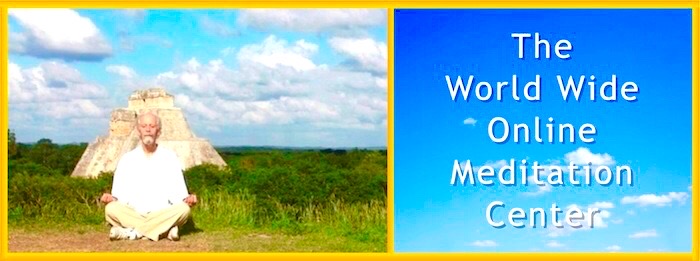
 These 8 points are a distillation of what I've learned over the past 50 years, to be the essential principles for making meditation easy and enjoyable. I give these points to all my beginning students, but whether you are a beginner or a more experienced meditator, I hope they will in some way enhance your meditation practice.
These 8 points are a distillation of what I've learned over the past 50 years, to be the essential principles for making meditation easy and enjoyable. I give these points to all my beginning students, but whether you are a beginner or a more experienced meditator, I hope they will in some way enhance your meditation practice.
Misconception 1 ~ Meditation requires much training to get it right.
Not true. Meditation can be easily learned and practiced. Meditation is only difficult if you become too concerned with doing it right. There is, in fact, no such thing as "right" or "wrong" meditation. There is only doing it or not doing it.
Misconception 2 ~ To meditate, you have to turn off your thoughts and make your mind blank.
Not true. Have you ever tried to make your mind blank through sheer will? For most people, it's just not going to happen - at least not for more than a few seconds. That's where the various methods come into play. By going through the steps of a particular method, your mind will begin to quiet down by itself -- some days more, some days less, as your meditation experiences are likely to differ from day to day.
Misconception 3 ~ To meditate, you have to be good at focusing your attention.
Not true. Although staying focused in meditation does become easier with time and practice, it is definitely not a requirement for beginning to meditate. Thinking that you should be good at focusing when first starting out is essentially putting the cart before the horse. What you will discover is that even if you are not good at focusing, you will still begin to notice many benefits in your life from meditating regularly.
Misconception 4 ~ There is one specific "state of meditation" and the aim is to get into that state.
Not true. There are many possible states of awareness you might experience when meditating, and they are all part of the process of meditation.
1. Put your expectations aside.
Forget about everything you may think is "supposed to" happen when you meditate, and completely accept whatever does happen. Regardless of what seems to be happening, if you are following the basic steps of your method, something valuable is occurring each time you meditate. Even if it seems as though nothing is happening, the meditation is catalyzing positive changes on a deep inner level of your being, and before long you will begin noticing these inner changes manifesting in your outer life.
2. Thoughts are not your enemy.
If you are busy fighting with your thoughts how can you experience inner peace? Thoughts are a natural product of the mind, and are actually one of the ways that stored up stress is released in meditation. At times, the thoughts will subside on their own -- the result of simply going through the steps of your method. However, as you continue meditating, you will discover that you can experience deep relaxation and inner peace even when there are thoughts in your mind.

3. Meditate with relaxed effort.
Relaxed effort - or " medium effort" - is somewhere between the two extremes of strenuous concentration and no effort at all -- between trying your brains out and simply spacing out.
4. The less concerned you are about what you experience in your meditation, the easier and more enjoyable it gets.
Over-importantizing anything tends to make it harder to attain.
Along with these 8 important points, I think you will find it helpful to understand the things that could conceivably derail your meditation practice. So, here are 6 things to lookout for. Ideally, you will use this information to help keep your meditation practice on track, rather than using it as 6 excuses to avoid meditating. :-)
1. No time 2. Not experiencing dramatic results immediately 3. Thinking that you aren't doing it right 4. Not comfortable being alone with your thoughts Admittedly, there are occasions when the thoughts a meditator is dealing with may be uncomfortable memories. In such cases, I understand that it can be doubly difficult to sit and be present with your thoughts. However, it's important to understand the valuable healing that occurs as a result of letting these memories come into the light of awareness. It's also important to understand that they will pass, and you will be free from the emotional charge connected with them. 5. Physical-emotional detoxification How do you recognize this process? You may experience a bit of negativity, according to the type of toxins you are releasing. If it's physically related, you may feel a little tired, physically off, or just sort of "yucky." If it's emotionally related, you may experience some of the feelings associated with the toxins you are releasing, such as irritability, anger or sadness. Typically, a detox phase will last anywhere from an hour to a day, although it can be a bit longer at times. 6. Unconscious resistance to growth and change We all have within us a force that resists growth and change. We also have a force within us which gently urges us to evolve and make positive changes. At times when the resistant force kicks in - and it generally does when we start doing something that accelerates our growth - you might find yourself avoiding your meditation. You may simply experience a feeling of resistance when it's time to meditate, or you may unconsciously devise a variety of creative ways to avoid meditating. To stay on track, rather than battling the resistance, simply try to follow the positive evolutionary force within you.
It's true that most people have busy lives with numerous demands on their time. But when I ask my students about the time factor, most admit that they could carve at least 10 minutes out of their busy day if they really made the effort.  So this one really comes down to making a firm commitment to finding time to meditate. If finding 10 minutes during your waking hours really is proving too difficult, I suggest you wake up just 10 minutes earlier to meditate. By increasing your energy and efficiency, 10 minutes of meditation will more then compensate for the 10 minutes of sleep you sacrificed.
So this one really comes down to making a firm commitment to finding time to meditate. If finding 10 minutes during your waking hours really is proving too difficult, I suggest you wake up just 10 minutes earlier to meditate. By increasing your energy and efficiency, 10 minutes of meditation will more then compensate for the 10 minutes of sleep you sacrificed.
The fact that we live in a world of instant gratification isn't really news to anyone, but this dynamic has been amped up in recent decades. Although noticing positive results - both in meditation and in ones life - can come about fairly quickly for some, for others, it takes a bit more time. If you happen to fall into the latter group, it's important to be willing to give meditation a reasonable amount of time to produce results - at least several months. If you stay with it, I guarantee you will get good results. Meanwhile, you will be cultivating patience - one of the many valuable things that can be learned from meditation.
No one likes to feel incapable, so it's understandable that such feelings could cause one to give up on meditation. However, in the world of meditation, there really is no "right" and "wrong" - "correct" and "incorrect." If you can truly accept this, and put aside the compelling need to do things well, struggling to get it right will become a non-issue.
Thoughts can be boring and repetitive, as well as fascinating and seductive. Most individuals aren't accustomed to being alone with their thoughts. Hence, it can take some time to get comfortable with the simple act of just sitting with nothing to distract you from them.
Meditation clears away the residue of unresolved stressful and traumatic experiences which have become stored in your body-mind as physical-emotional toxins. If you find that you are releasing these toxins in meditation - or outside of meditation - be aware that a very valuable healing process is occurring and will pass shortly, leaving you free from these health-destroying energies. When this detox is occurring, for some individuals the first instinct is to pull back from meditation. However, this is one of the most important times to continue your meditation, as it facilitates the clearing process.
Of our 6 derailers, I've discovered this to be the most troublesome. That's mainly because it works from a deep, unconscious level. Its workings are so subtle, that people generally deny it is occurring. But over the course of many years of teaching, I've learned to recognize the subtle signs in a student's demeanor when he or she goes into resistance.
Worldwide Online Meditation Center |